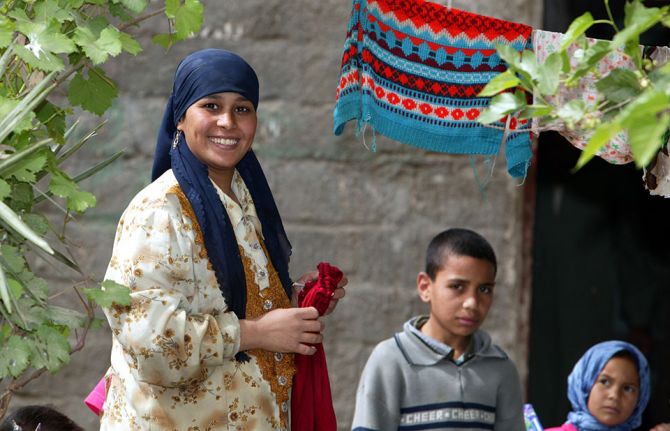

Feature Story
Stepping up sexual and reproductive health services in Egypt
04 June 2018
04 June 2018 04 June 2018In response to a call by women living with HIV in Egypt for an increase in the availability of quality sexual and reproductive health services delivered free from stigma and discrimination, UNAIDS mobilized partners and engaged with Egypt’s national AIDS programme.
The result was a pilot project that ran from 2016 to 2018 in which almost 300 women across the country were provided with family planning, antenatal care, support during delivery, postpartum care and guidance on the prevention of mother-to-child transmission of HIV.
On 30 May, national stakeholders, including representatives of the Ministries of Foreign Affairs and Health and Population, civil society, academia and people living with and affected by HIV, gathered to highlight the key achievements, experiences and lessons learned from the pilot.
“I benefited from the project counselling service throughout my pregnancy. I started taking medicine, and, with follow-up, I had a child free from HIV, which I never thought was possible or an option,” said an Egyptian woman living with HIV.
The pilot project achieved outstanding results, reaching nearly double the number of people originally planned to be reached and building institutional expertise in sexual and reproductive health. Counselling and psychosocial support was provided by health professionals and supported by women living with HIV.
“This project is a continuation of the collaboration and fruitful partnership between UNAIDS and the Egyptian Government. We congratulate the Government of Egypt for addressing the needs of a highly marginalized population,” said Ahmed Khamis, the UNAIDS Country Manager for Egypt.
Dr Ahmed Khamis, UNAIDS Country Manager, gives the opening speech on the closing and final dissemination of key results of the “Enhancing Sexual and Reproductive Health of Women Living with HIV” pilot project; with Dr Alaa Eid, Under Secretary for Preventive Medicine, Ministry of Health and Population, H.E. Laurens Westhoff, Ambassador of the Netherlands in Cairo and Ambassador Seif-alla Kandeel, Director of UN Specialized Agencies, Ministry of Foreign Affairs (from left to right). Photo taken by Mohamed Ezz
The pilot programme was funded through financial support from the Embassy of the Netherlands in Egypt and covered the Giza and Gharbia Governates of Egypt and was later extended to the Dakahlia Governate.
“The Netherlands is strongly committed to curbing the spread of HIV worldwide as an integral part of our contribution towards the achievement of the Sustainable Development Goals. We are proud of our partnership with UNAIDS and the Egyptian Ministry of Health. The Netherlands Government is committed to participate in the next step,” said Laurens Westhoff, Ambassador of the Netherlands to Egypt.
As the next step, the Netherlands is finalizing an agreement for a scaled-up three-year project, doubling the number of women living with HIV reached.
“There is no silver bullet to combat HIV. It’s only through partnership that the challenges of awareness, attention and access to medicine can be tackled,” said Seif-Allah Kandeel, Director, United Nations Specialized Agencies, Egyptian Ministry of Foreign Affairs.



